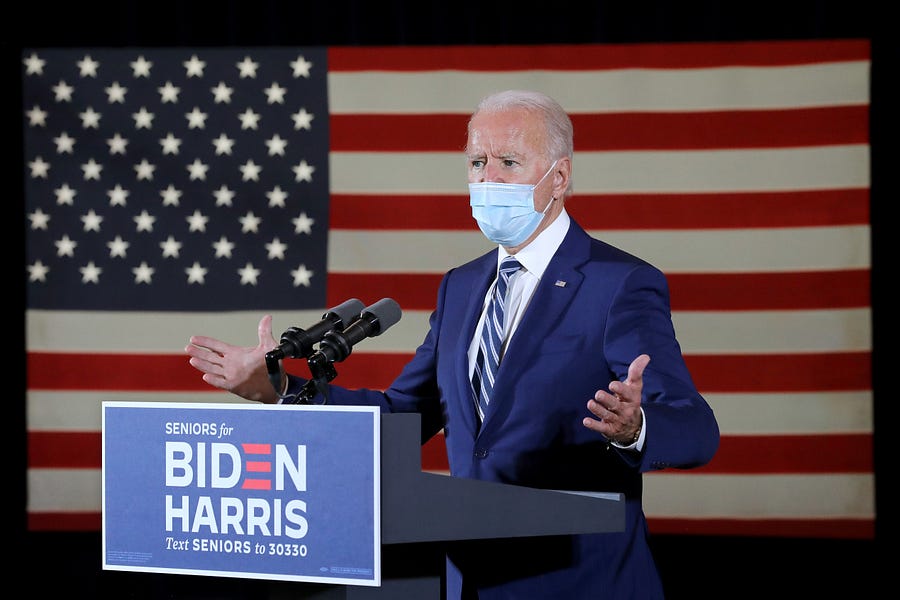With each passing day, Joe Biden’s campaign strategy looks more brilliant. From the outset, Biden refused to make himself the issue or get in the way of President Trump’s self-immolating behavior.
The single glaring exception? His terrible handling of the court-packing question.
It started as a gaffe—which Michael Kinsley famously defined as a politician accidentally telling the truth. I think Biden made the mistake of explaining his don’t-be-controversial strategy rather than merely executing it.
It’s a common mistake. George H.W. Bush once read a note-to-self out loud: “Message: I care.” Donald Trump does it so often, we barely notice. Remember how he said he didn’t want COVID-stricken cruise ship passengers to disembark in the U.S. because it would affect his “numbers”?
Biden was first asked about court packing by a Wisconsin reporter on Sept 21. “It’s a legitimate question,” he replied, “but let me tell you why I’m not going to answer that question. Because it will shift the focus. That’s what [Trump] wants. He never wants to talk about the issue at hand, and he always tries to change the subject.”
By the time of the presidential debate a week later, that answer was locked in. “Whatever position I take,” Biden said, “that will become the issue. … I’m not gonna answer the question.”
As a strategy, that’s pretty normal—politicians often duck controversial questions that divide their coalition and unite the opposition. But as an answer, the explanation was a hot mess.
Biden should have taken a page from Senate Majority Leader Mitch McConnell. Until the GOP lost the House, Trump constantly cajoled, pleaded, and demanded that McConnell eliminate the Senate’s legislative filibuster. McConnell refused to entertain the notion. He just said, “The votes aren’t there to change it.”
Of course McConnell opposes eliminating the filibuster. And if his past statements count for anything, Biden opposes court packing. If Biden had just said, “The votes aren’t there. This is all hypothetical,” the message to his base would have been: “Get the votes! Flip the Senate!” The message to moderates: “He’s so reasonable.”
A one-day story, if that.
If Biden’s aim was to prevent court packing from dominating campaign coverage, he failed. Saying aloud that you won’t answer an important question because the answer will be controversial isn’t something any politician should do. It only chums the water.
The need to defend his misstep has made things even worse for Biden, and for the issue. Last week, when Biden was asked by a television reporter whether voters “deserved” an answer to the court-packing question, he said no. Over the weekend, he claimed the GOP’s effort to appoint judges and justices according to the rules was “unconstitutional.” Biden, along with many Democrats, has redefined court packing to mean filling existing judicial vacancies, so they can call Republicans the real court packers.
Worse, Democrats (with help from boosters in the media) are pretending there’s nothing particularly bad about court packing.
Ever since FDR’s failed scheme in 1937, the term has meant expanding the number of seats to make room for additional politically pliable judges. It failed in 1937 because it was seen as a threat to democratic government. “Surely, Mr. Roosevelt’s mandate,” progressive journalist William Allen White wrote in 1937, “was to function as the president, not as Der Fuehrer.” The chairman of the Senate Judiciary Committee at the time, Henry Ashurst (a Democrat), called expanding the court a “prelude to tyranny.”
Supreme Court Chief Justice Charles Evans Hughes said FDR’s plan would “destroy the Court as an institution.” You know who agreed? The late Justice Ruth Bader Ginsburg.
“I think it was a bad idea when President Franklin Roosevelt tried to pack the court,” she told NPR’s Nina Totenberg last year. “If anything would make the court look partisan, it would be that — one side saying, ‘When we’re in power, we’re going to enlarge the number of judges, so we would have more people who would vote the way we want them to.’”
It’s remarkable how many of the people who see Ginsburg’s desire to be replaced by a Democrat as “marching orders” (in Sen. Elizabeth Warren’s words) find her considered opinion on court packing irrelevant. Even more remarkable: how many of the people who have rightly decried Trump’s damage to norms and institutions think the wisest response is to escalate the cycle.
On Monday, Biden finally said what many suspected all along: He doesn’t like the idea. That’s good news, but it would have been better if he’d said that before the Democrats convinced themselves court packing is a good idea.
Photograph by Chip Somodevilla/Getty Images.






Please note that we at The Dispatch hold ourselves, our work, and our commenters to a higher standard than other places on the internet. We welcome comments that foster genuine debate or discussion—including comments critical of us or our work—but responses that include ad hominem attacks on fellow Dispatch members or are intended to stoke fear and anger may be moderated.
You are currently using a limited time guest pass and do not have access to commenting. Consider subscribing to join the conversation.
With your membership, you only have the ability to comment on The Morning Dispatch articles. Consider upgrading to join the conversation everywhere.